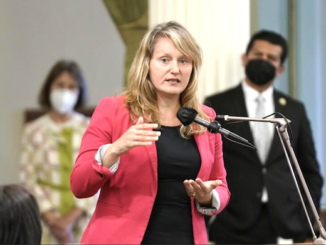
Last year, Google said it would pay $15 million into a fund to support local journalism if the Legislature would drop plans to tax the company for the news it takes from local news outlets.
The legislature accepted Google’s offer. Now the Mountain View-based company has said it will reduce its contribution to a local news fund by $5 million.
The company will now pay $10 million into the initiative to fund local news which will be distributed among California news publishers who meet the state’s criteria, according to the office of Assemblywoman Buffy Wicks, D-Berkeley, who set up the fund last year.
The fund she proposed hasn’t gone into action, however. Google didn’t put any money into the fund. And the group that was going to decide who gets the money, the UC-Berkeley Journalism School, has pulled out of the arrangement. It’s now been shifted to the state librarian, a position appointed by the governor.
Newsom cut the state’s own share of the first-year commitment to $10 million from $30 million, saying the 66% cut was justified because California faces a $12 billion budget deficit.
The fund will be administered by the state librarian, who will set up a board of publisher representatives to determine how to distribute it with the goal of “sustaining and enhancing community news coverage in California,” according to a news release from Wicks’ office. The library will also assess the regional availability of news coverage across California to help divvy up the money.
The state Librarian, a political appointee, will oversee the distribution of the fund’s public dollars while Google’s share of the money will be housed in a separate nonprofit.
The current state librarian is Greg Lucas, who was appointed by Gov. Jerry Brown in 2024. He used to be a reporter for the San Francisco Chronicle who covered Brown.
Proponents of the new program described the money as “seed funding” and said it would attract other donations from philanthropies interested in funding local journalism — a shift from lawmakers’ initial efforts to fund local news through regulations on the tech sector. Google said it would contribute more money if the state receives private donations.
Jaffer Zaidi, a vice president at Google’s parent company Alphabet, said in the release that the company is “committed” to the agreement it made last year.
In their original agreement, the state and Google each agreed to pay $10 million into the fund annually for four more years, for a total of $125 million. The funding now pledged amounts to less than half of what was promised for the program’s first year. The amount paid in future years could still change, depending on the state budget.
The tech titan agreed to the deal last August, having spent a record sum to lobby California lawmakers as they considered two bills that would have forced the company to pay to use news outlets’ published content.
Advocates for publishers and local news have honed in on the search engine’s ability to profit from links and snippets of news content as one factor that has diminished the news industry nationwide over the past two decades. California has lost one-third of its newspapers since 2005, in a trend experts say worsens civic engagement, polarization and misinformation.
In exchange for lawmakers killing the bills last year, the company agreed to instead help the state start a fund that would have given $125 million to news outlets across California over five years. Most of that money would have come from state taxpayers, while Google also agreed to continue paying its existing grants to news organizations and to pour tens of millions of dollars into an unspecified new artificial intelligence program.
The company will continue paying those grants, Wicks said.
Proponents of the legislation, including news publishers, journalists’ unions and local news advocates, criticized the handshake deal for being too modest. By contrast, one of the bills would have garnered about $500 million a year in fees from Google and other platforms that link to news content, to pay for a tax credit for local journalists.
Wicks, the author of the other bill, which would have required Google, Meta and other platforms to negotiate payments directly with news outlets, said the deal was the best possible outcome in the face of stiff tech industry opposition.
When Newsom announced the state would reduce its share of funding for the new program last week, it gave Google the opportunity to do the same: The company had only agreed to put money into the fund as a match to state dollars. — By CalMatters, a nonprofit, non-partisan news organization.
• Aug. 30, 2024 — Opinion: Google deal won’t save journalism
• Aug. 24, 2024 — Google kills bills that would have forced it to pay a fee for using local news


It gets tiring to hear local billionaires go on and on about how they fear democracy is dying. They could easily fund this journalism program and make a real difference in their community.